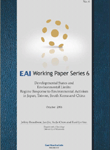
Developmental States and Environmental Limits
디지털 경제 시대와 한국의 경제외교 | 워킹페이퍼 | 2006-10-25
Jeffrey Broadbent
EAI Fellows Program Working Paper Series No.6
요약문
Government response to environmental problems is one of the key issues of our global era. Theorists differ on whether the state will respond voluntarily or as a result of popular pressure. In the rapid growth periods of the East Asian developmental states and societies – Japan (1970), Korea and Taiwan (1980s) and China (currently) – central government ministries guided growth and managed society toward that end. Their growth produced equally rapid and severe pollution, disruption and social complexity. Frustrated by their inability to control pollution and faced with rising social tensions damaging to their rule, the central ministries relaxed their grip on environmental activism. They permitted greater citizen activism around environmental issues, but not for other issues, and found ways to “use” this activism for environmental governance. The similarity of historical process in the four cases indicates the sys-temic interaction of economy and environment, mediated by similar core governmental ministries responding due to a mixture of ethical concern and social tensions.
저자
Jeffrey Broadbent is Professor of Department of Sociology at University of Minnesota. His research interests include Political Sociology, Network Analysis, Institutions and Culture, Social Movements, Japan, East Asia, Cross-national Comparison, and Environmental Politics.
 본 working paper는 미국 헨리루스재단의 지원을 받은 "EAI Fellows Program on Peace, Governance, and Development in East Asia"에 제출된 논문이며, 온라인 버전으로만 배포됩니다.
본 working paper는 미국 헨리루스재단의 지원을 받은 "EAI Fellows Program on Peace, Governance, and Development in East Asia"에 제출된 논문이며, 온라인 버전으로만 배포됩니다.
Human society around the world currently faces increasing global, regional and local environmental problems. Industrial growth has brought great prosperity, but has also brought environmental pollution and disruption. These problems present industrial civilization with a new dilemma -- how should we balance economic growth and environmental protection? The solutions to this dilemma involve not only technical invention, but also issues of governance and implementation in complex societies. Some degree of government involvement in setting rules and coordinating other social actors seems necessary. However, one major question, much debated in theoretical terms, is will government voluntarily take responsibility for controlling pollution and disruption, or will it only respond in the face of social protest? In theoretical terms, this question concerns the impact of environmental crisis on the constitution and response of both state and society. The framing of the research approach in this paper builds on the long line of theoretically-informed work on the “relative autonomy” of the state, that is, the state’s degree of independence from the (supposedly) more narrowly-focused interest groups and movements in society {Skocpol 1985b; Tilly 1992}. In the consideration of citizen activism as pressure on the state, the research framing adds the burgeoning work on social movements {Tarrow 1998}. Furthermore, environmental issues, as an irruption into human affairs from “Nature,” have added a new dimension to state-society interaction {Schnaiberg, et al. 2003}.
The cases of Japan, Korea, Taiwan and China, because their particular type of governmental institutions and strategies resulted in a particularly severe growth environment dilemma, take on special poignancy. Despite their many differences, during their time of rapid growth in particular, they all possessed some similar core governmental institutions: central ministries that guided the business sector and society toward maximum national power, growth and prosperity. 1 To that end, these ministries consulted with and orchestrated the investments of the business sector, while attempting to paternalistically impose a coordinated order on the rest of society. Theorists have labeled this form of growth-oriented ministerial guidance as the “developmental state” (Johnson 1982; Wade 1990; Applebaum and Henderson 1992; Johnson 1995; Evans 1995; Aoki 1997; Woo-Cumings 1999). In terms of state theory, developmental states and societies differ from predatory states that suck wealth out of society, laissez-faire states that keep “hands off” the market, and socialist states that exercise rigid top-down central planning (Johnson 1982; Evans 1995).
To the world’s surprise and confounding standard Western market theories of economic growth, in different time periods, all four East Asian developmental states and societies attained unprecedented, even “miraculous” rates of economic growth (Johnson 1982; Vogel 1991). The very fruits of their rapid growth, though, brought about equally sudden changes that challenged the value of their economic achievements. One prominent cost of rapid growth was vast environmental pollution. In addition, industrial growth drew migrants from villages to cities, raised educational standards, created a restless working class, a prosperous middle class, and a wealthy entrepreneurial class, and many other changes. New social problems emerged: urban crowding, breakdown of traditional community, scattering of the family and its traditional welfare functions, growth of an underclass of unemployed, and not least, environmental disturbances such as pollution and forced displacement...(Continued)
무역ㆍ기술ㆍ에너지 질서의 미래
디지털 경제 시대와 한국의 경제외교